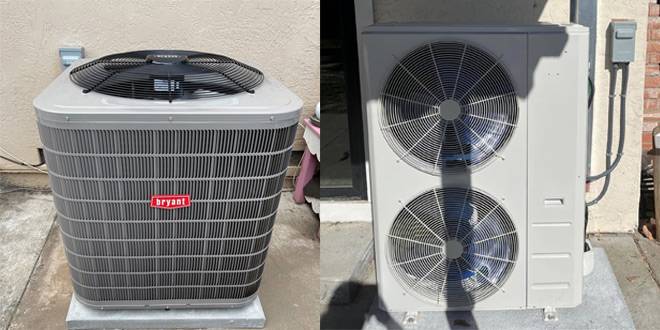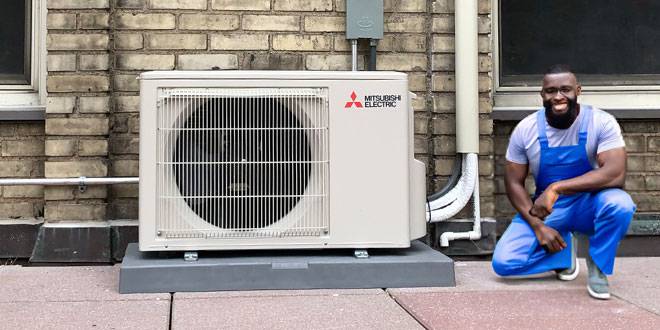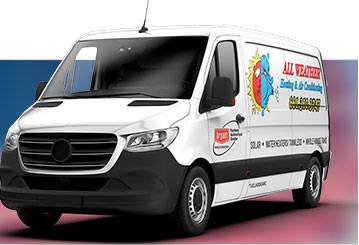
Heat pumps and traditional AC systems serve a common purpose: to keep your home comfortable during warmer seasons. However, their operation, efficiency, and suitability can vary significantly depending on various factors. For instance, a heat pump system can provide both heating and cooling, making it a versatile choice for year-round climate control. Traditional AC systems, on the other hand, are specifically designed to cool your home, offering powerful and efficient cooling during hot summer months.
Heat Pump vs Traditional AC: Comparing Efficiency and Performance
| Comparison Factor | Heat Pump | Traditional AC |
| Efficiency | Generally more efficient as they transfer heat instead of generating it. | Efficient in cooling but does not transfer heat, leading to higher energy use in heating. |
| Performance in Extreme Temperatures | Effective in moderate climates, efficiency can decrease in extreme cold. | Highly effective in extremely hot temperatures; only provides cooling. |
| Energy Consumption | Lower energy consumption due to the heat transfer method. | Higher energy consumption, especially in climates requiring both heating and cooling. |
| Environmental Impact | Lower environmental impact, reduces greenhouse gas emissions. | Higher carbon footprint due to energy consumption patterns. |
When considering a new cooling system for your home, understanding the efficiency and performance of heat pumps versus traditional air conditioning systems is crucial. At All Weather Heating & Air Conditioning, we’ve seen firsthand how the choice between these two systems can impact a homeowner’s comfort and energy consumption.
Efficiency of Heat Pump Systems
Air-source heat pumps are known for their efficiency, primarily because they transfer heat rather than generate it. In moderate climates, they can be exceptionally energy-efficient, especially the newer models that come with advanced technology. For example, during cooler months, a heat pump extracts warm air from the outside to warm the home; in warmer months, it reverses the process to cool the home. This dual functionality not only makes heat pumps versatile but also energy-efficient, potentially leading to lower utility bills.
Performance of Traditional AC Systems
Traditional air conditioners excel in this role while only providing cooling. They are particularly effective in regions with extremely high temperatures, where their cooling capacity can make a significant difference in home comfort. These systems work by circulating refrigerant, which absorbs heat from inside your home and releases it outside. While they might not be as energy-efficient as heat pumps in milder climates, in hot climates, their powerful cooling performance can be unbeatable.
Energy Consumption Comparison
When it comes to energy consumption, heat pumps generally consume less energy compared to traditional AC systems, thanks to their heat transfer method. This can be a crucial factor for environmentally conscious homeowners or those looking to reduce their carbon footprint. It’s important to note, however, that the efficiency of a heat pump can decrease in extremely cold environments, potentially making a traditional air conditioner a more reliable choice in such conditions.
Environmental Impact
Heat pumps not only save energy but also have a lower environmental impact. They reduce greenhouse gas emissions by minimizing the reliance on fossil fuels for heating. This is becoming increasingly important as we move towards more sustainable living practices. Traditional AC systems, while they have become more environmentally friendly over the years, still typically have a higher carbon footprint due to their energy consumption patterns.
In summary, when comparing heat pumps and traditional AC systems, it’s evident that each has its strengths. Heat pumps offer versatility and energy efficiency, making them an excellent choice for moderate climates and environmentally conscious consumers. Traditional AC systems, meanwhile, provide robust cooling capacity, especially in regions with high heat levels. Understanding these differences is key to making an informed decision that aligns with your specific needs and environmental priorities.
Cost Considerations
When deciding between a heat pump and a traditional air conditioning system, cost is a significant factor. This includes not only the initial purchase and installation cost but also long-term expenses such as energy bills and maintenance. At All Weather Heating & Air Conditioning, we believe in providing our customers with transparent information to make the best financial decisions for their homes.
| Cost Factor | Heat Pump | Traditional AC |
| Initial Purchase & Installation | Higher due to dual functionality. | Lower; however, requires separate heating system for winter. |
| Long-term Energy Savings | Significant savings due to higher efficiency. | Potentially higher costs due to separate heating system. |
| Maintenance Costs | Frequent maintenance, offset by energy savings. | Less frequent, but additional costs for separate heating system. |
| Financial Incentives | Often eligible for rebates and tax credits. | Less likely to qualify for energy-related incentives. |
Initial Purchase and Installation Costs
The initial cost of purchasing and installing a heat pump is generally higher than a traditional AC system. This is due to the heat pump’s dual functionality of heating and cooling. However, the investment can be cost-effective in the long run, especially in regions with moderate climates where the heating and cooling needs are balanced.
Traditional AC systems, while cheaper to install, often require an additional heating solution for colder months. This could mean an additional upfront cost for a separate heating system.
Long-term Energy Savings
Heat pumps are known for their energy efficiency, which can translate into significant savings on utility bills over time. They are particularly cost-effective in areas with mild winters, as they can efficiently handle both heating and cooling with less energy.
Traditional AC systems, while efficient in cooling, require separate heating systems in colder months, potentially leading to higher overall energy costs.
Maintenance Costs
The maintenance costs for heat pumps and traditional AC systems can vary. Heat pumps may require more frequent maintenance due to their year-round usage, but this can often be offset by the energy savings they provide. Traditional AC systems, while used less throughout the year, still require regular maintenance to ensure efficiency and longevity.
Potential Financial Incentives
It’s worth noting that there are often financial incentives available for installing energy-efficient systems like heat pumps. These can include rebates, tax credits, or reduced utility rates, which can help offset the higher initial cost.
In conclusion, while heat pumps may have a higher upfront cost, their efficiency and dual-functionality can offer long-term financial benefits. Traditional AC systems might be less expensive initially but can lead to higher overall costs when combined with a separate heating solution. We recommend considering both the immediate and long-term financial implications when choosing between these two options for your home.
Maintenance and Longevity
The longevity and maintenance requirements of your HVAC system are critical factors to consider when choosing between a heat pump and a traditional air conditioning system. At All Weather Heating & Air Conditioning, we emphasize the importance of understanding these aspects to ensure you get the most out of your investment.
| Aspect | Heat Pump | Traditional AC |
| Lifespan | Typically 15+ years with proper maintenance. | Around 10-15 years, depending on model and maintenance. |
| Maintenance Frequency | More frequent due to year-round use. | Less frequent, primarily seasonal use. |
| Durability | Durable, especially newer models. | Durable within primary function of cooling. |
| Overall Value | High long-term value despite maintenance. | High value if combined with efficient heating system. |
Heat Pump Maintenance and Longevity
Heat pumps typically have a longer lifespan than traditional AC units, often lasting up to 15 years or more with proper maintenance. Due to their year-round operation, regular maintenance is crucial for heat pumps to ensure efficient performance and prevent breakdowns. This includes routine tasks like cleaning or replacing filters, checking the thermostat, and ensuring the system is free from debris.
While heat pumps may require more frequent maintenance checks, their durability and efficiency in both heating and cooling can offer greater value over time. It’s also noteworthy that advancements in heat pump technology have continually improved their reliability and longevity.
Traditional AC System Maintenance and Longevity
Traditional AC systems generally have a lifespan of about 10 to 15 years, depending on the model and maintenance. Regular maintenance for traditional AC systems includes cleaning air filters, checking refrigerant levels, and ensuring the condenser and evaporator coils are clean. Proper maintenance can significantly extend the life of an AC unit and maintain its efficiency.
However, since traditional AC systems are typically used seasonally, they may endure less wear and tear compared to heat pumps, which could contribute to a longer operational life within their primary function of cooling.
Comparative Longevity and Upkeep
In comparing the two, heat pumps offer a dual function and can be a more cost-effective option over time despite potentially higher maintenance requirements. Traditional AC systems, while possibly having lower maintenance needs, may also require the addition of a separate heating system, which can add to the overall maintenance and longevity considerations.
Ultimately, the choice between a heat pump and a traditional AC system in terms of maintenance and longevity depends on your specific needs, the climate you live in, and how much you’re willing to invest in upkeep. Regular professional maintenance, which we at All Weather Heating & Air Conditioning are proud to provide, can significantly impact the efficiency and lifespan of both systems.
Choosing the Right System for Your Home

Selecting the best HVAC system — whether it’s a heat pump or a traditional air conditioning system — depends on various factors unique to your home and personal preferences. At All Weather Heating & Air Conditioning, we understand that every home and homeowner in Vacaville, CA, and surrounding areas has different needs, and we’re here to help guide you through this crucial decision.
Consider Your Climate
One of the most significant factors in choosing between a heat pump and a traditional AC system is your local climate. Heat pumps are incredibly efficient in areas with mild to moderate winters, as they can easily handle both heating and cooling. However, in regions with extremely cold temperatures, their efficiency can diminish, making traditional AC systems (paired with a separate heating solution) a more reliable option.
Assess Your Home’s Size and Layout
The size and layout of your home also play a crucial role in deciding the right system. Heat pumps are generally suitable for a wide range of home sizes, especially newer models designed for efficiency in larger spaces. In contrast, the cooling capacity of traditional AC systems must be carefully matched to the size of your home to ensure optimal performance and efficiency.
Energy Efficiency and Environmental Concerns
For those prioritizing energy efficiency and environmental sustainability, heat pumps often emerge as the preferable choice. Their lower energy consumption and reduced greenhouse gas emissions align well with eco-friendly living. Traditional AC systems, while less efficient than heat pumps, have also made significant strides in energy efficiency.
Budget and Long-Term Costs
Your budget, both for initial installation and long-term operation, is another critical consideration. While heat pumps have a higher upfront cost, their energy efficiency can lead to substantial savings on utility bills over time. Traditional AC systems might be less expensive initially but could incur higher costs over time, especially if you require an additional heating system.
Personal Comfort Preferences
Finally, consider your personal comfort preferences. Some individuals prefer the consistent and versatile climate control offered by heat pumps, while others might prioritize the powerful cooling capabilities of traditional AC systems.
In conclusion, whether you opt for a heat pump or a traditional air conditioning system, the decision should be based on a thorough evaluation of your climate, home size, budget, environmental concerns, and personal comfort preferences. At All Weather Heating & Air Conditioning, we are committed to helping you find the perfect system for your home, ensuring comfort and efficiency for years to come.
Ready to Upgrade Your Home Comfort?

Embrace the perfect balance of efficiency and comfort with All Weather Heating & Air Conditioning! ???????? Whether it’s a heat pump or a traditional AC system, we’ve got you covered. Contact us today for expert advice and top-notch service! Let’s make your home the oasis of comfort it deserves to be. ????????????

